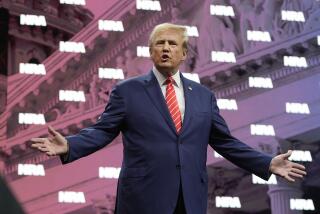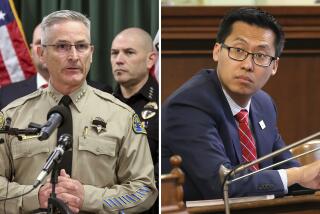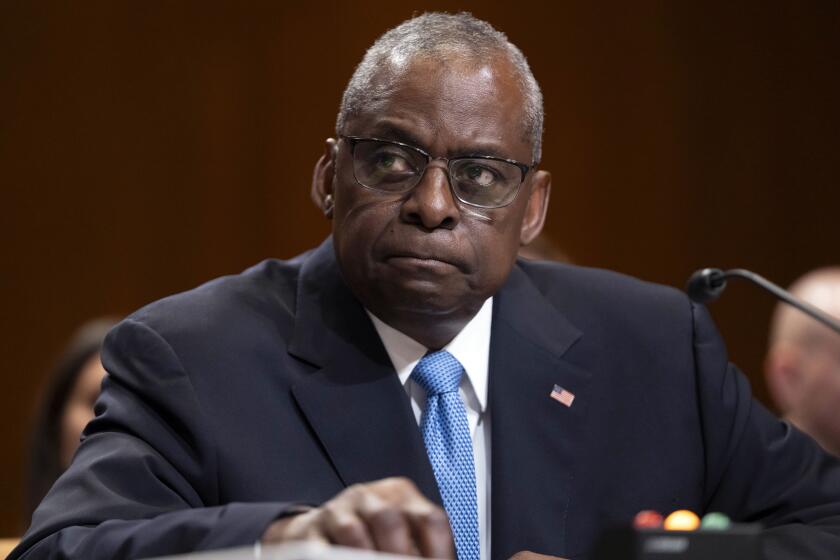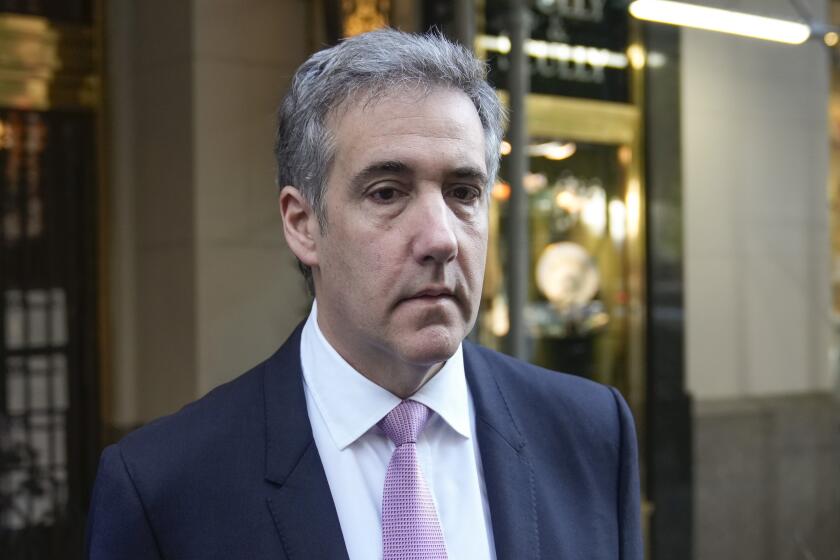Jackson Factor Presents a Complex Dilemma for Organized Labor
Organized labor this year will be more solidly behind the Democratic Party’s presidential nominee than it has for 20 years, and most AFL-CIO leaders are delighted that Massachusetts Gov. Michael Dukakis still looks to them like the winner.
But they are worried. These AFL-CIO leaders fear what has become known as the Jackson factor, and that does not mean they’re racists. They’re just convinced that the Rev. Jesse Jackson cannot be elected President of the United States, and they desperately want a winner.
Dukakis is electable, and he supports as many of labor’s liberal, socially conscious goals as any other candidate, except Jackson, who supports almost all of them.
Jackson has appeared at more union meetings, walked more picket lines and attended more labor rallies than Dukakis or any other candidate. He articulates, probably better than any of the others, not just the sophisticated policies of the nation’s labor leaders but the thoughts of many workers these days.
But as pragmatists, union leaders would rather have a winner than a candidate who is on their side almost every time.
AFL-CIO political experts gathered in Washington last week for a Committee on Political Education meeting and agreed that federation leaders should not even try to get a labor endorsement for Dukakis until after Atlanta’s Democratic Party convention in August.
The AFL-CIO executive council decided in February not to push for an early endorsement of any candidate because none of the seven hopefuls then in the race could get the required two-thirds majority at a federation convention.
There now seems to be a consensus for Dukakis among labor’s political experts, but Dukakis apparently still cannot command a two-thirds majority of AFL-CIO delegates.
Equally important, even if AFL-CIO leaders managed to get an endorsement for Dukakis, large numbers of union members, and Jackson himself, would view the move as an attempt to slow his astonishing campaign before it reaches its peak in delegate strength at the Atlanta convention.
It is important, too, for labor to have its goals put forth as effectively as Jackson is doing. Even if Jackson probably will not be able to carry labor’s message as the Democratic nominee, union leaders won’t try to cut him down while he is saying so well so many of the things they like to hear.
The philosophical agreement between Jackson and most union leaders doesn’t extend to many foreign policy issues.
Several high-level unionists agree with his call for cuts in military expenditures as one of the best ways to meet domestic needs and reduce the bloated federal deficit.
Many union leaders agree with Jackson on several key foreign policy questions, such as his furious denunciation of the role this country is playing in Central America and his relatively cordial attitude toward Cuban leader Fidel Castro. Many others, though, say Jackson’s policies are too radical.
And there is near-unanimity against some of his foreign policy stances, particularly on the Middle East, as symbolized by his warm embrace of Yasser Arafat, head of the Palestine Liberation Organization.
Yet so far labor leaders have not challenged Jackson directly, even on the foreign policy issues, for fear of antagonizing him or his large following, or being accused of racism.
Because labor has been unable to settle on one candidate, unions are playing a negligible role in selecting the Democratic nominee this year, in sharp contrast to 1984, when unions were the prime force behind the nomination of Walter Mondale.
Nevertheless, unless the rest of the primaries dramatically change the current lineup of candidates, labor’s caucus at the Democratic convention will be as large or larger than ever before.
Labor activists are getting on delegate slates of almost every candidate. That means the unions could play a major role in the final selection process if no one goes to the convention with a majority.
And this year, for the first time since 1968 when it endorsed Hubert H. Humphrey, the giant Teamsters Union will not endorse a Republican and is virtually certain to go along with the Democratic candidate endorsed by the AFL-CIO. The Teamsters rejoined the federation last year.
Even though Teamster President Jackie Presser is under indictment for alleged payroll padding, Republicans--especially George Bush--hardly will be able to criticize the Democratic nominee for accepting the union’s support.
The Teamsters have supported the Republican nominee for the past 20 years, except in 1976, when it remained neutral in the contest between Jimmy Carter and Gerald Ford.
In 1984, when the Teamsters endorsed Reagan again, Bush flew to the union’s convention to warmly accept the endorsement and told cheering Teamsters that “I don’t think this has any downside risk at all.”
Even though unions have been barely visible so far in the presidential race, they can and should play a major role in the general election.
Dismantle FAA, Says Transportation Chief
President Reagan’s secretary of transportation, James H. Burnley IV, might be a good choice for keynote speaker at the second convention of the fledgling National Air Traffic Controllers Assn.
NATCA was formed by the unhappy strikebreakers who were hired to replace the 11,400 air traffic controllers fired by Reagan in 1981 after they walked out to protest the problems stemming from the inadequacies of the Federal Aviation Administration.
The strikers’ replacements are worried about the same issues that troubled their predecessors: air safety and working conditions, which often are nearly intolerable. So they voted to be represented by the new union, an affiliate of the AFL-CIO’s Marine Engineers Beneficial Assn.
Reagan, infuriated by the “illegal” strike seven years ago, broke the old Professional Air Traffic Controllers Organization, which had endorsed him for President and wasn’t an affiliate of the AFL-CIO, which fought against his election. Reagan still refuses to pardon the strikers.
The President is not talking about firing his transportation secretary, who didn’t go on strike but who did echo the controllers’ bitter complaints in testimony at a Senate hearing Wednesday.
The fired controllers, their replacements and now Burnley charge that the Federal Aviation Administration’s inadequacies have endangered the safety of air passengers and deserve most of the blame for job problems that put extreme stress on many of those who regulate traffic in the sky.
Burnley furiously criticized the FAA as an “experiment which has failed,” and said it should be dismantled and its functions distributed among other government agencies.
John Thornton, national coordinator for NATCA, said he agreed with much of Burnley’s testimony and met with the secretary’s staff afterward.
Thornton sought and received assurances that Burnley isn’t laying the groundwork for an attempt to privatize the nation’s air traffic control system.
The fired air traffic controllers get little comfort from hearing their own accusations against the FAA repeated by a high-ranking Reagan appointee.
But it would be a decent gesture for Burnley to go to the next controllers’ union convention and tell them in person that the complaints of their fired predecessors were justified.
More to Read
Get the L.A. Times Politics newsletter
Deeply reported insights into legislation, politics and policy from Sacramento, Washington and beyond. In your inbox three times per week.
You may occasionally receive promotional content from the Los Angeles Times.






